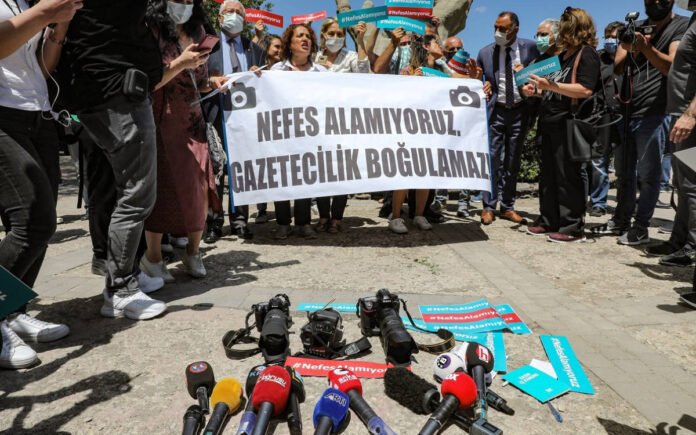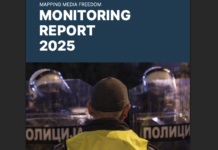Turkey ranked third among European Union candidate countries in press freedom violations in the first half of 2025, with 64 incidents affecting at least 157 journalists and media entities, according to a new report by the Media Freedom Rapid Response (MFRR).
Courts and judicial authorities were responsible for nearly half of the violations (48.4 percent), followed by police and state security (32.8 percent). More than half of the cases (59.4 percent) involved arrest, detention or imprisonment.
As of July, 17 journalists were in prison in Turkey. At least 15 journalists were convicted, receiving either time in prison or suspended sentences. The most common charges were “insulting the president,” “membership in a terrorist organization,” “spreading terrorist propaganda” or “violating the law on meetings and demonstrations.”
Journalists and media outlets in Turkey faced a new wave of pressure from state authorities after the March 19 detention of İstanbul Mayor Ekrem İmamoğlu, the main political rival of President Recep Tayyip Erdoğan, on corruption and terrorism-related charges. Widely seen as politically motivated, the move triggered mass protests across the country, and authorities responded by cracking down not only on demonstrators but also on the press.
A total of 19 violations were documented against journalists covering İmamoğlu’s arrest and the ensuing protests, most involving arrests, detentions and police violence. There were also eight cases of physical violence against a total of 22 media workers, all perpetrated by the police.
On March 21 police in Istanbul’s Saraçhane district assaulted at least nine reporters, firing tear gas, rubber bullets and pepper spray despite their press credentials. On March 23 further assaults left several journalists injured, including BirGün reporters Ebru Çelik and Deniz Güngör, who were pepper-sprayed, beaten and hit with rubber bullets.
The crackdown also extended to online platforms. Authorities imposed restrictions on all major social media platforms in anticipation of public outrage over the detention of İmamoğlu.
The Radio and Television Supreme Council (RTÜK) Turkey’s broadcasting regulator, continued its pressure on dissenting voices, targeting several news outlets with hefty fines and threatening to revoke their broadcasting licenses.
On March 19 RTÜK’s chairman threatened to revoke broadcast licenses from TV channels that failed to use only official government statements and prohibited coverage of public calls for protest over İmamoğlu’s arrest.
MFRR, established in 2020 and co-funded by the European Commission, is a Europe-wide mechanism that tracks, monitors and responds to violations of press and media freedom in EU member states and candidate countries.
Its report highlights that the scale and scope of violations in Turkey point to a continued decline in press freedom, with state institutions playing a central role in curbing independent reporting, particularly during one of the country’s most turbulent political periods.
Turkey, one of the world’s leading jailers of journalists, was ranked 159th out of 180 countries in the 2025 World Press Freedom Index, published by Reporters Without Borders (RSF).















